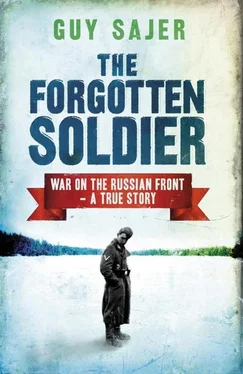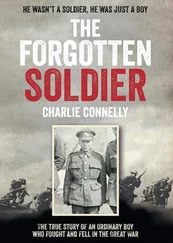The day is magnificent. On the roof it is almost painfully hot, and before long we are all stripped to the waist, as if on a beach. However, after a while the heat becomes disagreeable, and like many others I abandon my roost. Up to that moment though, it is quite amusing to look down at the frenzied maneuvers of the greenhorns under a torrent of abuse.
I find myself back in the courtyard in the company of that damned Lorrainer, who never talks about anything but his medical studies. As I am supposed to work as a mechanic with my father, I find all his chatter quite boring. What’s the point of thinking about a civilian future when you’ve just gone into the army?
There are still no orders for us. I walk about quite freely, and for the first time observe the details of this massive edifice. Everything about it is on a colossal scale. The smallest staircase is at least eighteen feet wide, and the whole mass is so imposing that one almost forgets its sinister character.
Beyond the entry and parallel to it rise the battlements. Another block composed of four towers like the towers of the porch completes the group of buildings. The entire mass both pleases and impresses me, and I feel in this Wagnerian decor a sense of almost invincible power. The horizon touches the vast dark-green forest on all sides.
The principal characteristic of the days which follow is a kind of robust pleasure. I learn to drive, first a big motorcycle; then a VW, and then a steiner. [2] Military automobile, similar to a jeep.
I grow so confident that driving these machines seems like child’s play, and I am able to manage them under any circumstances. There are fifteen of us passing around orders among ourselves without submitting to any authority, and we enjoy ourselves, like the boys we are.
October 10. The weather is still beautiful, but this morning the temperature is only twenty-five degrees. For the whole day we practice handling a small tank, driving it up some pretty steep slopes. There are fifteen of us aboard a vehicle intended for eight, which is quite uncomfortable. We manage to stay inside only by performing some extraordinary acrobatic contortions. We laugh all day, and by evening any one of us can handle the machine. We are dead tired and ache as if we’d all been given a good thrashing.
The next day, as we fling ourselves headlong into exercise, without calculating the cost of energy, and to counteract the cold, Laus calls out: “Sajer!”
I step forward.
“Lieutenant Starfe needs a Panzer driver, and as you particularly distinguished yourself yesterday… go and get ready.”
I salute, and take myself off at a gallop. It’s not possible… I, the best driver in the platoon! I literally leap with joy, and, in less than no time, am dressed and back in the courtyard. I begin to run to the command quarters, but that proves unnecessary, as Lieutenant Starfe is already waiting for me. He is a thin, angular man, but does not look disagreeable. It seems that he was gravely wounded in Belgium and has stayed in the army as an instructor. I snap to attention.
“Do you know the way to Cremenstovsk?” he asks.
“Jawohl, Herr Leutnant.”
To tell the truth, I am only guessing that this is the road on which we sometimes run into companies who seem to be coming from that village. But I feel too pleased to hesitate. For once I am being asked for something more than a simple exercise.
“Good,” he answers, smiling. “Let’s go, then.”
Starfe points to one of the tanks we were using yesterday. Something that looks like a four-wheeled trailer is attached to it. In fact, it’s an 88, covered with a camouflage net. I settle into the driver’s seat and turn on the engine: the gauge shows only two and a half gallons, which isn’t enough, and I ask permission to fill the tank. Permission is granted, and I am congratulated for this elementary observation. We start a few minutes later. My vehicle proceeds somewhat nervously past the porch and over the bridge. I cannot bring myself to look at Starfe, who must surely have noticed my deplorable beginner’s technique. About 600 yards from the castle I turn off toward what I think must be the road to Cremenstovsk. For about ten minutes I roll along at a moderate speed, in a state of considerable anxiety about my itinerary. We pass two Polish carts loaded with hay. They take one look at my Panzer, and make for the side of the road. Starfe looks at me and smiles at their precipitate flight.
“They think you did that on purpose. They’ll never believe it’s because you haven’t mastered the machine.”
I don’t know whether I’m supposed to laugh at this observation, or take it as a warning. I feel more and more nervous, and jolt the poor lieutenant as if he were riding a camel. Finally we arrive at a decrepit group of buildings. I look desperately for a signpost, but all I can see is the gang of tow-headed boys who have rushed out to see us go by, at the risk of falling beneath our treads.
Suddenly I catch sight of about a hundred German vehicles parked in the road, and Starfe points to a building with a flag flying in front of it. I heave a sigh of relief. We were on the road to Cremenstovsk after all.
“You’ll have at least an hour to wait,” Starfe tells me. “Go to the canteen and see if they can give you something hot.”
As he speaks, he pats me on the shoulder. I feel very much moved by the friendliness of this lieutenant to whom I have just given such a frightful journey. I would never have guessed that this man whose face is somewhat frightening would be capable of a quasi-paternal gesture.
I walk over to a building which looks like a town hall. A notice board carries a white-on-black inscription: SOLDATENSCHENKE 27 eKOMPANIE. Soldiers are continuously going in and out. As there is no sentry, I walk in, and through a room where three soldiers are busy unpacking crates of food. Beyond this room is another, with a counter at the back, beside which a group of soldiers are standing and talking.
“Could I have something hot? I’ve just driven an officer over here, but I don’t belong to the 27th.”
“So,” mutters the soldier behind the bar. “Another one of these damned Alsatians pretending to be German.”
It’s plain that I speak hideously badly.
“I’m not Alsatian, but half German, through my mother.”
They don’t press me. The one behind the bar goes off into the kitchen. I stay where I am, planted in the middle of the room, wrapped in my heavy green overcoat. Five minutes later, the soldier is back with a steaming canteen half filled with goat’s milk. He pours a full tumbler of alcohol into this, and hands it to me without a word.
It is burning hot, but I drink it down all the same. Every eye is fixed on me. I have never liked the taste of alcohol, but I am determined to finish this liter at any price, so that I won’t look like a green girl.
I leave this bunch of louts without saluting, and find myself out in the cold once again. This time I feel certain that the Polish winter has arrived. The sky is overcast, and the thermometer has fallen to twenty degrees.
I don’t really know where to go. The square is almost empty. In the surrounding houses, Poles must be warming themselves in front of their fires. I walk over to the parking lot, where some soldiers are busy with the trucks. I venture a few words, but they reply without enthusiasm. I must be too young for them: these characters are already in their thirties. I continue my aimless wandering, and catch sight of three bearded men wearing long overcoats of a strange brown color, who are cutting a tree trunk into lengths with a large all-purpose saw. I don’t recognize their uniforms.
I walk up to them, smile, and ask them if everything’s all right.
Читать дальше












